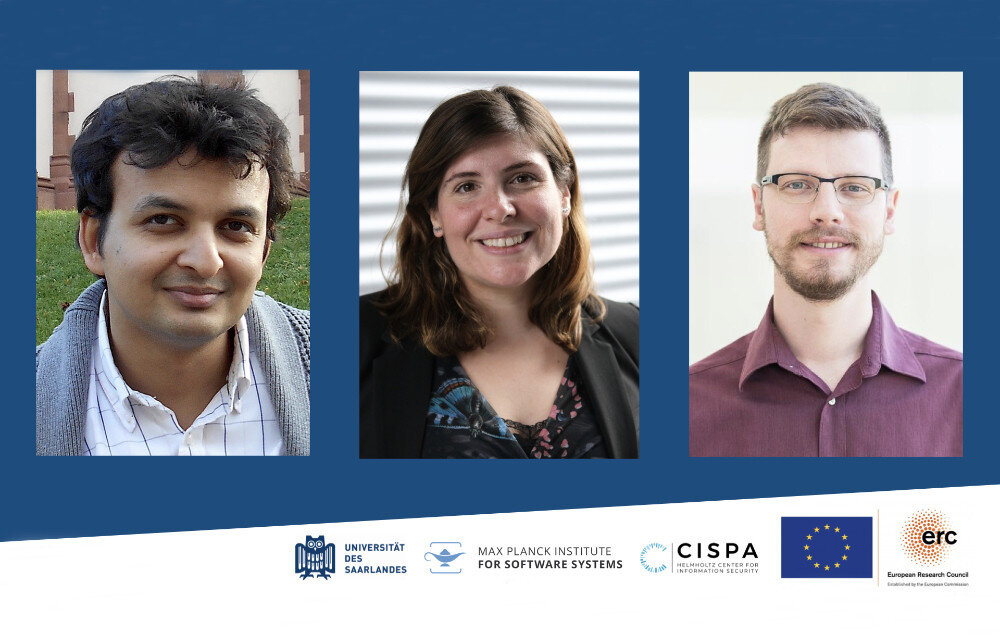4.5 million euros in EU funding for Saarbrücken computer science research
A Joint Press Release by Saarland University, the Max Planck Institute for Software Systems and CISPA Helmholtz Center for Information Security
This year, three computer scientists from Saarbrücken were awarded an “ERC Starting Grant” by the European Research Council. This award, endowed with 1.5 million euros each, is among the most prestigious research grants worldwide. It is intended to support particularly promising research of young scientists. The awarded projects are in the fields of artificial intelligence and cybersecurity.
This means that three of the four ERC Starting Grants awarded to computer scientists in Germany this time go to Saarbrücken. The award-winners raised a total of 4.5 million euros in third-party funding for Saarbrücken’s computer science. The individual projects at a glance:
Isabel Valera is Professor of Computer Science at Saarland University since April 2020. Her research focus is machine learning, more specifically fair algorithms. In the EU-funded project “Society-Aware Machine Learning”, Isabel Valera wants to develop a completely new methodological approach for the development of machine learning algorithms. Her new approach is to take into account the interests of all parties affected by an algorithm and thus ultimately contribute to fairer machine learning applications that are accepted by society. “Today, artificial intelligence is already used in many sensitive areas: In the granting of loans, to fill jobs, or to display personalized advertising on the Internet. To ensure that AI does not discriminate or act unfairly in instances like these, algorithms are needed that take into account the interests of all parties affected,” says AI expert Isabel Valera.
Dr. Adish Singla has been a tenure-track faculty at the Max Planck Institute for Software Systems in Saarbrücken since 2017. His research focus is “Machine Teaching”, a subfield of Artificial Intelligence. In his ERC project “Machine-Assisted Teaching for Open-Ended Problem Solving: Foundations and Applications”, Adish Singla wants to develop an AI-driven tutoring system for open-ended learning domains such as programming, conceptual puzzles, and virtual reality environments. The system will automatically adapt to a learner’s level of knowledge and provide feedback according to their needs, design exercises, and suggest consolidation tasks. “The best way to learn something new is to be individually supervised by a teacher in the process. But since it is not possible to provide every learner with a personal, human teacher, computer-based tutoring methods are a promising solution. In addition to providing solid foundations, we will demonstrate the performance of our techniques in a wide range of pedagogical applications in open-ended domains,” says Adish Singla.
The third of the honorees is Dr. Nico Döttling. The encryption expert is since 2018 researcher at the CISPA Helmholtz Center for Information Security, focusing on public-key encryption and secure multiparty computations. He is funded by the EU for his research on so-called “Laconic Cryptography”. In the LACONIC project, he wants to develop new computationally efficient cryptographic methods and techniques that guarantee security when computing on very large amounts of data. His research could, for example, pave the way for the secure use of machine learning methods in medicine.
The first two projects are located at Saarland Informatics Campus (SIC). In recent years, a total of 27 Grants of the European Research Council (including 13 Starting Grants) have gone to Saarbrücken. The Saarland Informatics Campus offers a diverse AI research landscape: In addition to the German Research Center for Artificial Intelligence (DFKI), numerous scientists at Saarland University and the Max Planck Institutes for Informatics and Software Systems, which are also located at the campus, work on topics related to artificial intelligence. Furthermore, the two internationally renowned AI initiatives CLAIRE (Confederation of Laboratories for Artificial Intelligence Research in Europe) and ELLIS (European Laboratory for Learning and Intelligent Systems), which last year have been awarded the German AI Award, are also active on campus.
Further Information:
https://erc.europa.eu/news/StG-recipients-2021
https://erc.europa.eu/sites/default/files/document/file/erc_2021_stg_results_all_domains.pdf
Questions can be directed at:
Professor Dr. Isabel Valera
ivalera@cs.uni-saarland.de
+49 (0)681 302-57328
https://ivaleram.github.io/
Dr. Adish Singla
adishs@mpi-sws.org
+49 681 9303 8201
https://machineteaching.mpi-sws.org/adishsingla.html
Dr. Nico Döttling
doettling@cispa.de
+49 681 302 70783 (Unternehmenskommunikation CISPA)
https://cispa.de/de/people/nico.doettling/
Background Saarland Informatics Campus:
900 scientists (including 400 PhD students) and about 2100 students from more than 80 nations make the Saarland Informatics Campus (SIC) one of the leading locations for computer science in Germany and Europe. Five world-renowned research institutes, namely the German Research Center for Artificial Intelligence (DFKI), the Max Planck Institute for Informatics, the Max Planck Institute for Software Systems, the Center for Bioinformatics and the Cluster for “Multimodal Computing and Interaction” as well as Saarland University with three departments and 24 degree programs cover the entire spectrum of computer science.
Editor:
Philipp Zapf-Schramm
Competence Center Computer Science
Saarland Informatics Campus
Phone: +49 681 302-70741
Press photos for download for use free of charge in connection with this press release:
Die Öffentlichkeitsarbeit am Saarland Informatics Campus wird unterstützt durch das Kompetenzzentrum Informatik Saarland, gefördert aus Mitteln des Europäischen Fonds für regionale Entwicklung (EFRE) und Mitteln der Staatskanzlei Saarland.




